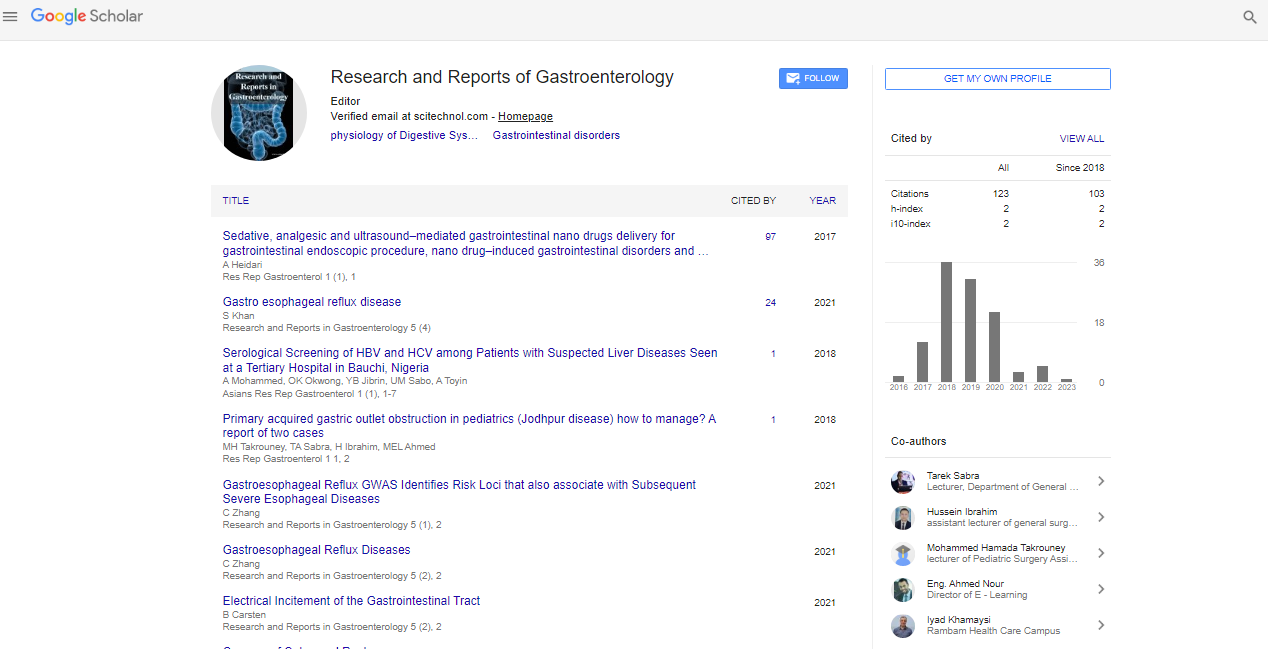Perspective, Res Rep Gastroenterol Vol: 7 Issue: 4
Exploring Gastrointestinal Health with Microbial Allies
Kendra Stintzi*
1Department of Biochemistry, University of Ottawa, Ottawa, Canada
*Corresponding Author: Kendra Stintzi,
Department of Biochemistry, University
of Ottawa, Ottawa, Canada
E-mail: stinzikendra@gmail.com
Received date: 20 November, 2023 Manuscript No. RRG-24-124017;
Editor assigned date: 22 November, 2023, PreQC No. RRG-24-124017 (PQ);
Reviewed date: 06 December, 2023, QC No. RRG-24-124017;
Revised date: 13 December, 2023, Manuscript No. RRG-24-124017 (R);
Published date: 20 December, 2023, DOI: 10.4172/Rrg.1000154
Citation: Stintzi K (2023) Exploring Gastrointestinal Health with Microbial Allies. Res Rep Gastroenterol 7:4.
Description
The human gastrointestinal tract is a complex ecosystem, hosting trillions of microorganisms collectively known as the microbiota. These microscopic residents, including bacteria, viruses, fungi, and archaea, play a crucial role in maintaining the delicate balance within our digestive system. The intricate interplay between the host and these microorganisms influences not only digestive functions but also immune responses, metabolism, and overall well-being.
Role of microbiota in gastrointestinal health
Digestive harmony: The microbiota contributes to the breakdown of complex carbohydrates, production of essential vitamins, and the metabolism of certain drugs. In essence, these microorganisms act as digestive allies, aiding in the absorption of nutrients and energy from the food we consume.
Immune system modulation: A harmonious relationship with the microbiota is crucial for a well-functioning immune system. The gut houses a significant portion of the body's immune cells, and the microbiota plays a pivotal role in training and regulating these cells. A balanced microbiome helps guard against infections while preventing inappropriate immune responses, such as autoimmune reactions.
Metabolic impact: The microbiota has a profound impact on metabolism, influencing how the body processes and stores energy. Imbalances in the gut microbiome have been linked to conditions such as obesity and metabolic syndrome. Research suggests that certain bacterial species contribute to the regulation of energy metabolism and may play a role in maintaining a healthy weight.
Protective barrier function: The microbiota contributes to the integrity of the intestinal barrier, a critical defense mechanism against harmful substances. A well-maintained barrier prevents the entry of pathogens and toxins into the bloodstream, safeguarding the body from infections and inflammation.
Gut-brain connection
Recent research has highlighted the bidirectional communication between the gut and the brain, known as the gut-brain axis. The microbiota plays a key role in this axis, influencing not only gastrointestinal function but also mental health and cognitive processes. Imbalances in the gut microbiome have been associated with conditions like Irritable Bowel Syndrome (IBS), anxiety, and depression, emphasizing the intricate connection between gut health and mental well-being.
The food we consume directly impacts the composition and diversity of the gut microbiota. A diet rich in fiber promotes the growth of beneficial bacteria, while excessive consumption of processed foods and sugars can lead to an overgrowth of harmful microbes.
Antibiotics, while crucial for treating bacterial infections, can indiscriminately disrupt the balance of the gut microbiome. Other medications, such as proton pump inhibitors and non-steroidal antiinflammatory drugs, may also influence the composition of the microbiota.
Factors such as stress, physical activity, and sleep patterns can affect the microbiota. Chronic stress, in particular, has been linked to alterations in the gut microbiome, highlighting the importance of a holistic approach to health. Probiotics, live microorganisms that confer health benefits when consumed in adequate amounts, and prebiotics, non-digestible fibers that promote the growth of beneficial bacteria, have gained popularity for their potential to support gastrointestinal health.
These beneficial bacteria, found in supplements or fermented foods like yogurt and kimchi, can positively influence the composition of the gut microbiota. Probiotics may help restore balance after antibiotic treatment, alleviate symptoms of certain digestive disorders, and contribute to overall gut health.
Prebiotics serve as fuel for beneficial bacteria, promoting their growth and activity. Foods rich in prebiotics include garlic, onions, bananas, and whole grains. Including prebiotic-rich foods in the diet can contribute to a flourishing and diverse microbiota.
The intricate relationship between the microbiota and gastrointestinal health underscores the importance of nurturing our internal microbial community. As research continues to unveil the mysteries of the gut microbiome, the significance of maintaining a balanced and diverse microbiota for overall well-being becomes increasingly evident. From digestive harmony to immune system support and even mental health, the microbiota emerges as a vital player in the symphony of human health, inviting us to explore and understand the profound impact of these microscopic inhabitants within us.
 Spanish
Spanish  Chinese
Chinese  Russian
Russian  German
German  French
French  Japanese
Japanese  Portuguese
Portuguese  Hindi
Hindi 